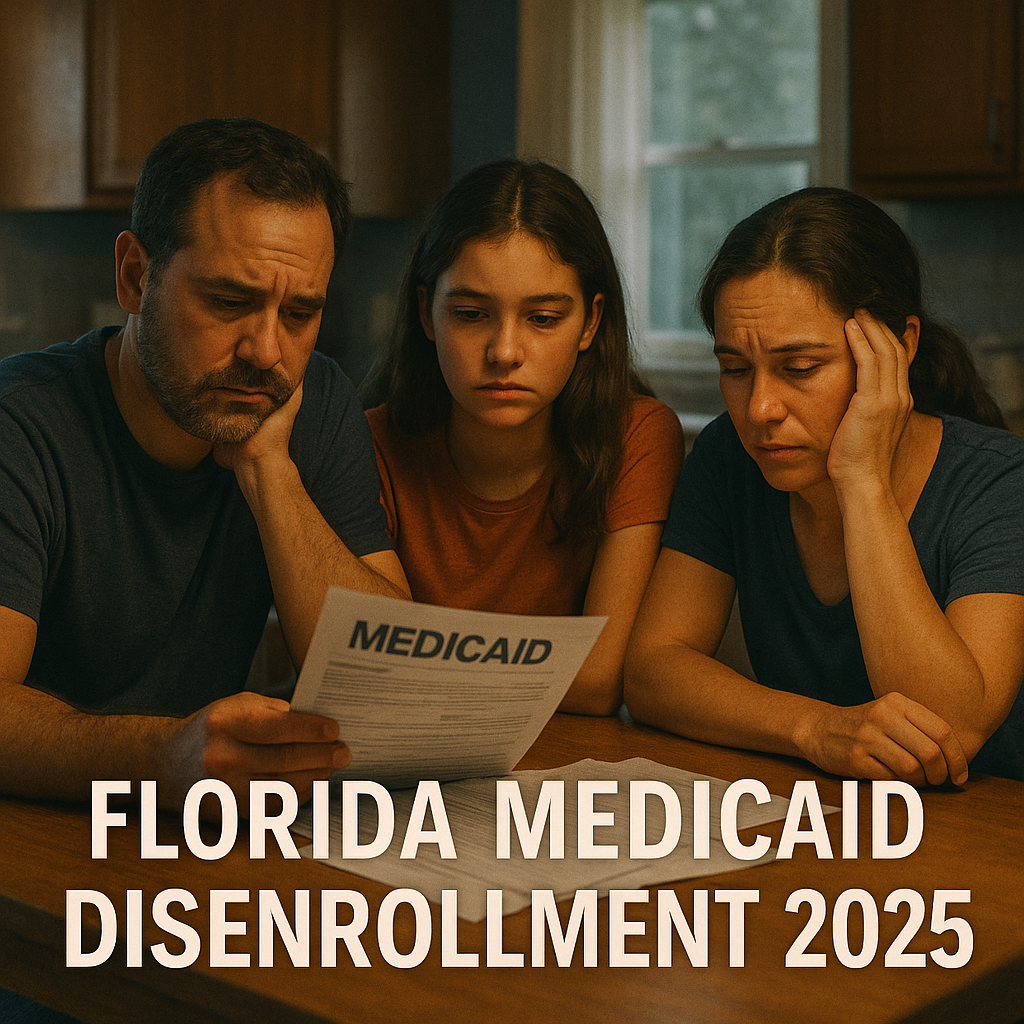Florida Medicaid Disenrollment 2025: 1.4 Million Lose Coverage in Unwinding

Florida’s most vulnerable residents are facing a dire loss of healthcare access as the state removed 1.4 million people from Medicaid, a staggering 27% drop in just two years. Triggered by the end of pandemic-era protections, this Florida Medicaid disenrollment 2025 crisis, reported by Newsweek and the Kaiser Family Foundation (KFF), has left families scrambling for alternatives amid procedural errors and complex redetermination processes. With over 542,000 children among those affected, advocates warn of worsening health outcomes, rising medical debt, and strained safety-net providers. Why did so many lose coverage, and what can be done to bridge the gap? This article explores the causes, consequences, and ongoing challenges of Florida’s Medicaid unwinding.
Scope of the Disenrollment
Florida’s Medicaid and Children’s Health Insurance Program (CHIP) enrollment plummeted from 5,088,076 in March 2023 to 3,735,641 by March 2025, a loss of approximately 1.4 million enrollees, per KFF data. This 27% decline outpaces other populous states like California and New York, though Texas saw a larger drop of 1.8 million, per Newsweek. The state’s disenrollment rate of 38% is among the highest nationally, compared to Montana’s 57% and North Carolina’s 12%, per KFF. Notably, 64% of Florida’s terminations were for “procedural reasons” rather than ineligibility, such as missed renewal forms, outdated contact information, or administrative errors, per KFF. Over 542,000 children were disenrolled by April 2024, with only 88,409 transitioning to Florida’s CHIP (KidCare), leaving many uninsured, per the Florida Policy Institute.
The unwinding began after the March 2023 expiration of the Families First Coronavirus Response Act’s continuous coverage provision, which had paused eligibility checks during the COVID-19 pandemic, boosting Florida’s Medicaid rolls from 3.8 million in February 2020 to 5.5 million by November 2022, per the Florida Department of Children and Families (DCF). By March 2025, enrollment was just 4% above pre-pandemic levels, signaling a sharp rollback.
Causes of Disenrollment
The massive coverage loss stems from both policy and administrative factors:
- Procedural Terminations: KFF found that 64% of Florida’s disenrollments were due to procedural issues, such as failure to respond to mail notices, moves during the pandemic, or confusion over the complex redetermination process, per Newsweek. Only 36% were due to ineligibility, like income changes.
- Limited Automation: States with higher ex parte (automated) renewal rates, like North Carolina, saw lower disenrollments. Florida’s lower use of automated renewals contributed to its high procedural termination rate, per William Schpero of Weill Cornell Medicine.
- Lack of Medicaid Expansion: Florida is one of 10 states that have not expanded Medicaid under the Affordable Care Act (ACA), leaving adults with incomes up to 138% of the federal poverty level ($21,597 for an individual in 2025) without coverage options, per KFF. This creates a “coverage gap” for low-income adults who earn too much for Medicaid but too little for ACA marketplace subsidies.
- Inadequate Outreach: A KFF poll showed 65% of Medicaid enrollees were unaware states could resume disenrollments post-pandemic, per Newsweek. Despite DCF’s claims of “robust outreach” via multiple channels, advocates like Lynn Hearn of the Florida Health Justice Project reported “a high volume of errors” in eligibility determinations, per Health News Florida.
- Legal Challenges: A lawsuit filed on August 22, 2024, by three Florida residents against the Agency for Health Care Administration (AHCA) and DCF alleged inadequate termination notices, violating federal law, per the Center on Budget and Policy Priorities.
Impacts on Floridians
The disenrollment wave has profound consequences:
- Children’s Health: The loss of 542,000 children from Medicaid, with only 88,409 transitioning to KidCare, suggests many are now uninsured, risking delayed care and worsening chronic conditions, per the Florida Policy Institute. The Department of Health and Human Services (HHS) flagged Florida among nine states with the highest child disenrollment rates, urging adoption of federal waivers to protect eligible kids, per CBPP.
- Financial Strain: Loss of coverage is linked to increased medical debt and financial instability, as patients face unaffordable bills, per Schpero. Safety-net providers, like Federally Qualified Health Centers, face rising uncompensated care costs, threatening their financial stability, especially with looming Medicaid cuts under the proposed One Big Beautiful Bill Act.
- Health Outcomes: Uninsured individuals are more likely to skip necessary care, leading to higher emergency room visits, later cancer diagnoses, and increased mortality, per Paul Shafer of Boston University. Florida’s 393,000 uninsured adults with mental illness and 12 daily opioid overdose deaths highlight unmet needs, per Mental Health America.
- Coverage Gap: Non-expansion of Medicaid leaves low-income adults without affordable options. For example, a non-pregnant adult in Florida must earn less than 12% of the federal poverty level ($2,452.80 annually for a household of two) to qualify, per the Center for American Progress.
Policy Context and Criticism
Florida’s decision not to expand Medicaid under the ACA, reaffirmed by the state Senate in January 2024, exacerbates the crisis, per the Florida Phoenix. Expansion could cover 2.13–2.63 million additional enrollees by 2029, costing $11.1–$17.2 billion to the state over a decade, per the Paragon Institute. Critics argue this leaves $5 billion in federal funds unclaimed, per Florida Policy Institute, while supporters claim it protects Florida’s low-tax environment and prevents crowding out other priorities like education, per Paragon Institute.
Advocates, including the Florida Health Justice Project, have called for pausing disenrollments until system improvements, like better notices and automated renewals, are implemented, per Disability Rights Florida. Florida’s refusal to adopt HHS-offered policy flexibilities to reduce child disenrollments drew criticism, as it was the only state to opt out, per Florida Policy Institute. The state’s 90-day grace period for late redeterminations, with retroactive coverage if eligible, is a mitigation step, but advocates argue it’s insufficient, per DCF.
Broader Implications
- Healthcare Access: The coverage gap and procedural terminations exacerbate disparities, particularly for Black, Hispanic, and Native American populations, who rely heavily on Medicaid, per KFF. Florida’s 11th-highest rate of uninsured adults with mental illness underscores systemic gaps, per Florida Policy Institute.
- Economic Fallout: Uninsured patients increase uncompensated care costs, straining hospitals, especially rural ones, at risk of closure under proposed Medicaid cuts, per Shafer. Medicaid accounts for 72% of Florida’s $46.5 billion health and human services budget, per Florida Policy Institute.
- Future Policy Risks: The One Big Beautiful Bill Act and Project 2025’s proposed lifetime Medicaid caps could disenroll 7–11 million more Americans by 2034, per the Congressional Budget Office and Center for American Progress. Florida’s non-expansion status would amplify impacts, leaving low-income adults with incomes as low as $2,452.80 annually ineligible, per Center for American Progress.
- Legal Remedies: The ongoing lawsuit against AHCA and DCF seeks to reinstate improperly disenrolled individuals and pause terminations until notices improve, per CBPP.
What Can Be Done
- Check Eligibility: Update contact information with DCF via the MyACCESS portal (myaccess.florida.gov) to ensure renewal notices are received, per Florida Blue.
- Explore Alternatives: Enrollees losing Medicaid can apply for ACA marketplace plans within 60 days of coverage loss, potentially qualifying for premium tax credits, or explore Florida’s Medically Needy Program, per Florida Blue. Florida KidCare offers low-cost coverage for children, per DCF.
- Appeal Denials: If deemed ineligible, appeal within 10 days of the denial letter via DCF, per MyFLFamilies.
- Seek Assistance: Contact Florida’s Medicaid Choice Counselors at 1-877-711-3662 or Healthcare Navigators via MyFloridaCFO, per MyFLFamilies.
- Advocate for Change: Support groups like the Florida Health Justice Project pushing for better redetermination processes and Medicaid expansion, per Florida Health Justice.
Conclusion
The Florida Medicaid disenrollment 2025 crisis, with 1.4 million people, including over 542,000 children, dropped from coverage, exposes deep flaws in the state’s unwinding process. Procedural errors, limited automation, and Florida’s refusal to expand Medicaid have left many without affordable care, risking worse health outcomes and financial strain. As legal challenges and advocacy efforts push for reform, individuals must navigate complex systems to regain coverage. Can Florida address this healthcare disaster and protect its most vulnerable? Share your thoughts below and stay informed on this critical issue.










